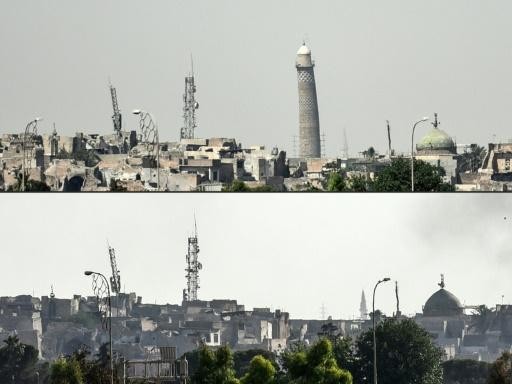
Mosul's iconic leaning Al-Hadba minaret before and after Islamic State group jihadists blew it up on June 21, 2017 along with the adjacent Great Mosque of al-Nuri Mosul's iconic leaning Al-Hadba minaret before and after Islamic State group jihadists blew it up on June 21, 2017 along with the adjacent Great Mosque of al-Nuri © MOHAMED EL-SHAHED - AFP/File
ishtartv.com - yourmiddleeast.com
July
10, 2017
Mosul,
wrested from the Islamic State jihadist group on Sunday, is Iraq's second city
and one of its cultural jewels.
The
jihadists seized it in a lightning offensive in June 2014 that humiliated
Iraq's security forces, who launched their massive operation to retake it in
October last year.
Here
are some facts about Mosul:
Trading
hub
The
Mosul area is rich in oil and the city straddles the Tigris River about 350
kilometres (220 miles) north of Baghdad, and 50 kilometres (30 miles) south of
Iraq's biggest dam.
It
has long been a trading hub between Iraq, Syria and Turkey, and its population
was once a mosaic of Arabs, Kurds, Turkmen, Christians and other minorities.
Muslin,
the fine cotton fabric that is one of the city's best-known products, derives
its name from "Mosul".
The
city controls key supply routes in northern Iraq, notably a highway to the
border with Syria and its second city of Aleppo.
IS
lab
Mosul's
population, which has fallen from a peak of around two million, now comprises
mostly Sunni Arabs, and after Saddam Hussein was defeated the jihadist group
Al-Qaeda took root there.
On
June 10, 2014, fighters from the Islamic State in Iraq and the Levant (ISIL)
seized the city, and on June 29, ISIL leader Abu Bakr al-Baghdadi proclaimed an
Islamic "caliphate" that included Mosul, the Syrian city of Raqa and
large patches of territory in Iraq and Syria.
He
named it the Islamic State, and made his first public appearance on July 5 at
Mosul's famed Great Mosque of al-Nuri.
IS
militants turned the city into an urban model for their state, setting school
programmes, operating hours for shops and dress codes. The sale of alcohol and
cigarettes was forbidden.
The
city's historic centre was dotted with church spires, and it was home to an
estimated 35,000 Christians when IS arrived. Christians were ordered to
convert, pay a special tax, or leave, and almost all fled.
Cultural
demolition
Starting
in July 2014, IS began to destroy Shiite Muslim mosques and sanctuaries, some
of which had been richly adorned and stood for centuries.
Militants
burned thousands of rare books and manuscripts in the city's vast museum and
smashed priceless statues.
IS
rigged the Nabi Yunus shrine -- revered by both Muslims and Christians as the
tomb of Prophet Jonah -- with explosives and blew it up. It also destroyed the
Prophet Seth shrine.
The
extent of the damage to the archaeological site where the Nineveh ruins lie in
east Mosul is not yet clear.
The
Old City of Mosul, on the western side of the river, is also considered of
major cultural value. On June 21, as Iraqi forces advanced in the Old City, the
jihadists blew up the Nuri mosque and Mosul's iconic leaning minaret, known as
the "Hadba" (Hunchback), which had been a symbol of the city for
centuries.
Troubled
history
Mosul
was conquered by Arabs in 641 and reached its cultural peak in the 12th century
before falling to Mongols in 1262, and then to Persians and Ottomans.
The
city became part of Iraq when the country was created out of the ashes of the
Ottoman Empire in the 1920s.
Britain
annexed the oil-rich region in 1918, to the dismay of France which sought to
attach it to Syria, under a French mandate.
Nineveh
has always been a border region, keenly contested by its rival communities and
their powerful supporters in neighbouring states.
In
the early years of this century, Mosul proved a bastion of Saddam's most
dedicated supporters who became a foundation of IS, and extortion and
protection rackets in the city were a major source of jihadist funding before
it was overrun.
|